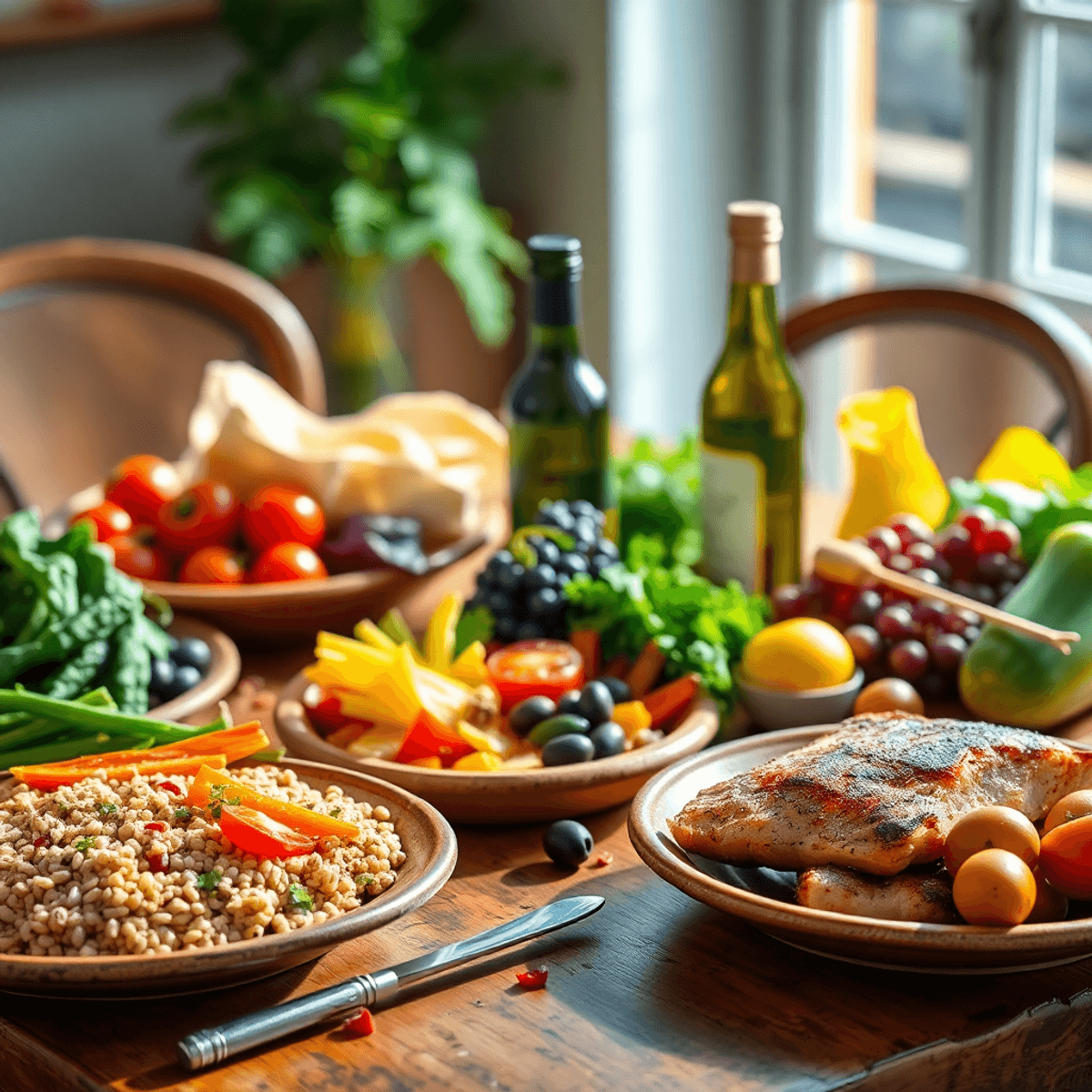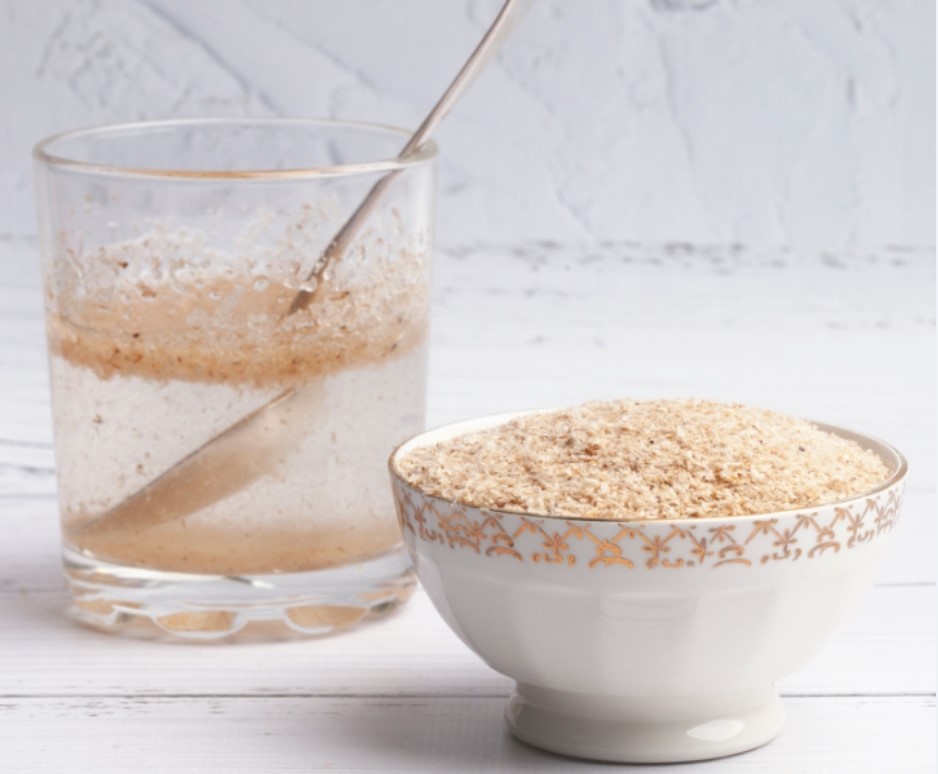The Mediterranean diet is a shining example of healthy eating, inspired by the traditional cooking practices of countries along the Mediterranean Sea. This proven approach to nutrition focuses on fresh, whole foods and simple, tasty preparations that nourish both the body and the soul.
Research has consistently shown the remarkable health benefits of this eating pattern:
- Enhanced Brain Function: Studies link the diet to improved cognitive performance and reduced risk of neurodegenerative diseases
- Stronger Heart Health: Regular consumption can lower blood pressure and decrease the risk of cardiovascular disease
- Increased Longevity: People following this diet often enjoy longer, healthier lives
- Better Weight Management: The diet’s focus on whole foods helps maintain healthy body weight
Creating Mediterranean-inspired dinners brings these health advantages to your daily routine. A typical Mediterranean dinner plate features colorful vegetables, lean proteins, whole grains, and heart-healthy fats like olive oil. These meals don’t just fuel your body—they create opportunities for connection, encouraging you to slow down and savor each bite.
Ready to transform your dinner routine? Let’s explore the essential components and creative recipes that make Mediterranean dining both delicious and nutritious. You’ll discover how simple ingredients can create extraordinary meals that support your health goals while delighting your taste buds.
In addition to its numerous benefits, the Mediterranean diet can also play a crucial role in women’s health, particularly during the menopause phase. By adopting some menopause-friendly nutritional changes, individuals can alleviate certain symptoms associated with this transition while promoting overall health.
Moreover, if you’re looking for effective strategies for weight management, incorporating principles from the Mediterranean diet could be beneficial. The focus on whole foods not only aids in maintaining a healthy body weight but can also complement practices like intermittent fasting or even a more extended 96-hour fast which has been shown to enhance gut health and boost weight loss effectively.
Key Components of the Mediterranean Diet
The Mediterranean diet centers around four essential pillars that form the foundation of this nutritious eating pattern:
1. Whole Grains: Your Energy Powerhouse
- Brown rice, quinoa, and whole wheat bread serve as primary energy sources
- Rich in complex carbohydrates for sustained energy release
- High fiber content supports digestive health
- B vitamins present aid in metabolism and brain function
2. Fresh Fruits and Vegetables: Nature’s Medicine
- Colorful produce delivers essential vitamins and minerals
- Dark leafy greens pack calcium and iron
- Citrus fruits provide immune-boosting vitamin C
- Berries offer potent antioxidants that fight inflammation
- Root vegetables supply fiber and minerals
3. Lean Proteins: Muscle Support
- Fish rich in omega-3 fatty acids (salmon, sardines, mackerel)
- Poultry provides lean protein with less saturated fat
- Legumes offer plant-based protein alternatives
- Eggs deliver complete protein and essential nutrients
4. Healthy Fats: Heart-Protective Elements
- Extra virgin olive oil – the cornerstone of Mediterranean cooking
- Nuts and seeds supply protein and beneficial fats
- Avocados provide monounsaturated fats
- Olives contain heart-healthy compounds
These components work together to create satisfying meals that support your health goals. The Mediterranean diet encourages combining these elements in creative ways – drizzling olive oil over roasted vegetables, adding nuts to whole grain dishes, or pairing lean proteins with colorful produce. This approach ensures you receive a wide spectrum of nutrients while enjoying delicious, wholesome meals.
In addition to these dietary changes, some individuals may explore medications like Ozempic or Jardiance for weight management or diabetes care. Ozempic can lead to prolonged fullness after meals, which could assist in maintaining a healthy weight while following the Mediterranean diet. On the other hand, Jardiance is another option for managing Type 2 diabetes. If you’re considering a switch from Jardiance to Ozempic, it’s important to understand the key considerations involved in this process. Proper hydration also plays a crucial role in overall health and wellness, making it an essential aspect to consider alongside your dietary choices.
Seafood-Based Dinner Recipes
Seafood is a key part of Mediterranean cooking. It’s packed with omega-3 fatty acids, high-quality protein, and important nutrients. These recipes bring the true tastes of the Mediterranean to your dinner table while promoting heart and brain health.
Walnut-Rosemary Crusted Salmon
Ingredients:
- 4 salmon fillets
- 1 cup crushed walnuts
- 2 tablespoons fresh rosemary
- 2 tablespoons olive oil
- Salt and pepper to taste
Instructions:
- Mix crushed walnuts with chopped rosemary
- Brush salmon with olive oil
- Press walnut mixture onto salmon
- Bake at 400°F for 12-15 minutes
Charred Shrimp with Pesto & Quinoa Bowls
Ingredients:
- 1 pound large shrimp
- 1 cup quinoa
- 1/2 cup homemade pesto
- Cherry tomatoes
- Fresh basil leaves
Instructions:
- Cook quinoa according to package instructions
- Grill shrimp until charred (2-3 minutes per side)
- Toss with pesto
- Serve over quinoa with tomatoes and basil
Mediterranean Fish Tips
Your seafood-based dinners benefit from these preparation methods:
- Grilling enhances natural flavors, especially for fish caught during ice fishing, which can be grilled effectively.
- Steaming preserves nutrients
- Baking with herbs infuses aromatics
- Pan-searing creates crispy textures
Recommended Cooking Temperatures:
- Fish fillets: 145°F
- Shrimp: until pink and opaque
- Scallops: until firm and pearly white
Fresh herbs like dill, parsley, and oregano complement seafood dishes perfectly. Pair your seafood with roasted vegetables or whole grain sides for a complete Mediterranean meal.
However, if you’re considering incorporating more plant-based meals into your diet for long-term health benefits, you might find this guide on plant-based diets helpful. It’s also important to note that certain medications, such as Ozempic, which is often used for managing Type 2 diabetes, may have gastrointestinal side effects including bowel injuries as highlighted in this article about Ozempic and bowel injury risks. If you’re pregnant or planning to become pregnant, it’s crucial to understand the safety of continuing Ozempic during this time by referring to this resource on Ozempic use during pregnancy.
Chicken-Based Dinner Recipes
Chicken serves as a versatile protein choice in Mediterranean cooking, offering lean nutrition while absorbing the vibrant flavors of herbs, spices, and olive oil. These chicken-based recipes bring authentic Mediterranean tastes to your dinner table.
1. Tandoori Chicken Salad
A protein-rich dish combining aromatic spices with fresh vegetables
Ingredients:
- 4 chicken breasts
- 2 tbsp tandoori spice mix
- Greek yogurt for marinade
- Mixed salad greens
- Cherry tomatoes
- Cucumber slices
- Red onion
- Olive oil dressing
Instructions:
- Marinate chicken in yogurt and tandoori spices for 2 hours
- Grill chicken until cooked through
- Slice and serve over fresh salad ingredients
- Drizzle with olive oil-based dressing
2. Skillet Chicken with Orzo & Tomatoes
A one-pan meal combining tender chicken with pasta and vegetables
Ingredients:
- Chicken thighs
- Orzo pasta
- Cherry tomatoes
- Garlic cloves
- Fresh oregano
- Chicken broth
- Lemon juice
Instructions:
- Brown chicken thighs in skillet
- Add orzo, tomatoes, and broth
- Simmer until pasta is tender
- Finish with fresh herbs and lemon
3. Greek Chicken Souvlaki
Traditional Greek street food made healthy
Ingredients:
- Chicken breast chunks
- Olive oil
- Lemon juice
- Garlic
- Dried oregano
- Wooden skewers
- Pita bread
- Tzatziki sauce
Instructions:
- Marinate chicken in olive oil, lemon, and herbs
- Thread onto soaked wooden skewers
- Grill until golden and cooked through
- Serve with warm pita and tzatziki
These chicken dishes incorporate key Mediterranean ingredients like olive oil, fresh herbs, and vegetables. Each recipe provides a balanced combination of protein, whole grains, and vegetables.
However, if you’re considering weight loss management while enjoying these delicious meals, it’s important to be mindful of certain factors like alcohol consumption, especially if you’re using medications such as Wegovy. You can learn more about Wegovy and its interaction with alcohol here.
Moreover, it’s crucial to be aware of how gut health can impact your overall well-being, including aspects such as weight management and digestion. For instance, some individuals may experience constipation due to an imbalance of gut microbes, a condition known as Intestinal Methanogen Overgrowth (IMO). This issue can often be overlooked but understanding it could lead to effective treatments. You can explore this hidden cause of constipation further in this systematic review and meta-analysis.
Plant-Based Meal Ideas for a Mediterranean Diet Dinner
Plant-based meals serve as the cornerstone of the Mediterranean diet, offering rich nutrients while supporting environmental sustainability. These meals pack essential vitamins, minerals, and fiber while reducing your carbon footprint.
1. Vegan Lentil Soup
A hearty, protein-rich soup perfect for cold evenings
Ingredients:
- 2 cups green lentils
- 1 onion, diced
- 3 carrots, chopped
- 2 celery stalks, sliced
- 4 garlic cloves, minced
- 2 tbsp olive oil
- 1 can diced tomatoes
- 6 cups vegetable broth
- 1 tsp cumin
- Salt and pepper to taste
Instructions:
- Sauté onion, carrots, celery in olive oil.
- Add garlic, cook until fragrant.
- Add lentils, tomatoes, broth, seasonings.
- Simmer 25-30 minutes until lentils are tender.
This meal is not just delicious but also contributes to a balanced diet, essential for maintaining overall health.
2. Zucchini Noodle Caprese
A light, refreshing alternative to traditional pasta
Ingredients:
- 4 medium zucchini
- 2 cups cherry tomatoes, halved
- 8 oz fresh mozzarella pearls
- Fresh basil leaves
- 2 tbsp olive oil
- Balsamic glaze
- Salt and pepper to taste
Instructions:
- Spiralize zucchini into noodles.
- Toss with olive oil, tomatoes, mozzarella.
- Garnish with fresh basil.
- Drizzle with balsamic glaze.
3. Mediterranean Cauliflower Rice Bowl
A versatile base for any plant-based meal
Ingredients:
- 1 head cauliflower, riced
- 1 can chickpeas, drained
- 1 cup cherry tomatoes
- 1 cucumber, diced
- Kalamata olives
- Red onion, sliced
- Hummus for serving
These meals not only support a healthier lifestyle but also provide proven ways to boost immunity during seasonal changes through their rich nutrient content.
Incorporating these plant-based meals into your diet can also be beneficial when combined with other healthy practices such as intermittent fasting, which has shown positive effects on metabolic health according to recent research.
Additionally, it’s essential to note that dietary choices made during childhood can have lasting impacts on heart health, making it crucial to instill healthy eating habits from a young age.
Whole Grain and Vegetable-Centric Dishes Inspired by the Mediterranean Diet Dinner Ideas
Whole grains and vegetables are the stars of Mediterranean cuisine, making for delicious and healthy dinner options. Here are three standout recipes that highlight the best Mediterranean ingredients:
1. Whole Grain Spinach Ravioli with Artichokes & Olives
- 2 cups whole wheat flour
- 3 eggs
- 1 cup fresh spinach, chopped
- 1 cup ricotta cheese
- 1/2 cup artichoke hearts, diced
- 1/4 cup Kalamata olives, sliced
- 2 tablespoons olive oil
- Fresh basil for garnish
Instructions:
- Mix flour and eggs to create pasta dough.
- Fill with spinach-ricotta mixture.
- Cook in boiling water for 3-4 minutes.
- Toss with olive oil, artichokes, and olives.
2. Slow-Cooker Mediterranean Stew
- 1 cup pearl barley
- 2 zucchini, chunked
- 3 carrots, sliced
- 1 can diced tomatoes
- 2 cups vegetable broth
- 1 tablespoon herbs de Provence
- 4 garlic cloves, minced
Instructions:
- Add ingredients to slow cooker.
- Cook on low for 6-8 hours until barley is tender and vegetables are soft.
3. Spaghetti Squash with Brussels Sprouts and Crispy Shallots
- 1 spaghetti squash
- 2 cups Brussels sprouts, halved
- 3 shallots, thinly sliced
- 3 tablespoons olive oil
- Salt and pepper to taste
Instructions:
- Roast squash at 400°F for 40 minutes.
- Sauté Brussels sprouts until charred.
- Top with crispy fried shallots and drizzle with olive oil.
These dishes combine ancient grains and seasonal vegetables for hearty meals packed with fiber and nutrients. The cooking methods used help retain the natural flavors while maximizing nutritional benefits.
Building Wholesome Mediterranean Bowls for Dinner Time
Mediterranean bowls offer a customizable, nutrient-packed dinner option that brings together the diet’s essential components in one satisfying dish. Here’s your guide to creating the perfect Mediterranean bowl:
Base Layer Options
- Quinoa or brown rice
- Mixed salad greens
- Pearl couscous
- Bulgur wheat
- Cauliflower rice
Protein Selections
- Crispy falafels
- Roasted chickpeas seasoned with cumin
- Grilled fish chunks
- Shredded chicken
- Lentils with Mediterranean herbs
Roasted Vegetable Ideas
- Sweet potato cubes with paprika
- Bell peppers and red onions
- Zucchini slices with oregano
- Eggplant chunks with za’atar
- Cherry tomatoes with garlic
Fresh Toppings
- Diced cucumber
- Kalamata olives
- Crumbled feta cheese
- Fresh mint leaves
- Toasted pine nuts
Sauce Combinations
- Classic hummus
- Creamy tzatziki
- Tahini dressing
- Lemon-herb vinaigrette
- Baba ganoush
To build your bowl, start with 1 cup of your chosen base. Add ½ cup protein and 1-2 cups roasted vegetables. Top with 2-3 fresh ingredients and a generous dollop of sauce. The key lies in balancing textures and flavors – combine creamy elements like hummus with crunchy vegetables and tender proteins. Drizzle with extra virgin olive oil and a squeeze of lemon juice for an authentic Mediterranean touch.
While enjoying these wholesome meals, you might also want to explore additional aspects of your health. For instance, if you’re considering weight management options, you can check out this comprehensive guide on Phentermine vs. Ozempic, which compares these effective weight management medications.
Moreover, maintaining a balanced diet is crucial for overall wellness, including mental health. Regular exercise has been shown to provide numerous benefits for mental health, making it an essential part of any wellness routine.
In addition to physical health, don’t forget about skincare. The latest breakthroughs in skincare technology can greatly enhance your beauty routine.
Lastly, ensuring good sleep quality is another aspect of wellness that should not be overlooked. You can find expert tips and techniques on improving sleep quality in the Sleep & Relaxation Archives at WellnessHQ.
Finally, if you’re looking for some healthy snack ideas that align with a diabetic-friendly diet, this ultimate guide for healthy snacks for diabetes could be very helpful.
Remember to prep ingredients in bulk on weekends to create quick dinner bowls throughout the week. Store components separately in airtight containers for maximum freshness.
Conclusion
The Mediterranean diet offers a wide range of dinner ideas that make healthy eating both enjoyable and sustainable. From delicious seafood dishes to colorful plant-based meals, this dietary approach turns everyday ingredients into tasty, health-boosting meals.
Your journey towards healthy eating habits starts with simple steps:
- Stock your pantry with Mediterranean staples like olive oil, whole grains, and legumes
- Plan your weekly menu around fresh, seasonal produce
- Experiment with new herbs and spices to enhance flavors
- Share meals with family and friends to embrace the social aspect of eating
The Mediterranean Diet dinner ideas presented here serve as your practical guide to embracing this time-tested eating pattern. By incorporating these recipes and principles into your daily routine, you’re not just preparing meals – you’re investing in your long-term health and well-being.
Remember: the Mediterranean diet isn’t a temporary fix – it’s a sustainable lifestyle that celebrates good food, good health, and good living.
FAQs (Frequently Asked Questions)
What are the main health benefits of following a Mediterranean diet for dinner?
The Mediterranean diet offers numerous health benefits including improved brain health, enhanced heart health, and increased longevity. Incorporating Mediterranean diet dinner ideas helps create balanced and nutritious meals that support overall well-being.
What key components should I include in my Mediterranean diet dinners?
Mediterranean diet dinners emphasize whole grains for energy and fiber, fresh fruits and vegetables rich in vitamins and antioxidants, lean proteins like seafood and poultry to support muscle health, and healthy fats such as olive oil that promote heart health.
Can you suggest some seafood-based dinner recipes aligned with the Mediterranean diet?
Certainly! Delicious seafood-based Mediterranean dinner recipes include Walnut-Rosemary Crusted Salmon, Charred Shrimp with Pesto & Quinoa Bowls, and Portobello Mushroom Pizzas served with Arugula Salad. These dishes combine nutritious ingredients with flavorful preparation methods.
How can I incorporate plant-based meals into my Mediterranean diet dinners?
Plant-based meals are vital for the Mediterranean diet’s health benefits and sustainability. You can try Vegan Lentil Soup, Cauliflower Rice Bowls with optional Grilled Chicken, or Zucchini Noodle Caprese to creatively include plant-based ingredients in your dinners.
What are some whole grain and vegetable-centric dinner ideas inspired by the Mediterranean diet?
Nutritious whole grain and vegetable-focused dishes include Spinach Ravioli with Artichokes & Olives (using whole grain pasta), Slow-Cooker Mediterranean Stew packed with veggies, and Spaghetti Squash with Brussels Sprouts and Crispy Shallots. These meals highlight wholesome ingredients essential to the diet.
How do I build a wholesome Mediterranean bowl for dinner?
To create a balanced Mediterranean bowl, combine roasted vegetables, legumes like chickpeas or falafels, and flavorful sauces such as hummus or tzatziki. This approach ensures a variety of textures and nutrients aligned with Mediterranean dietary principles.






